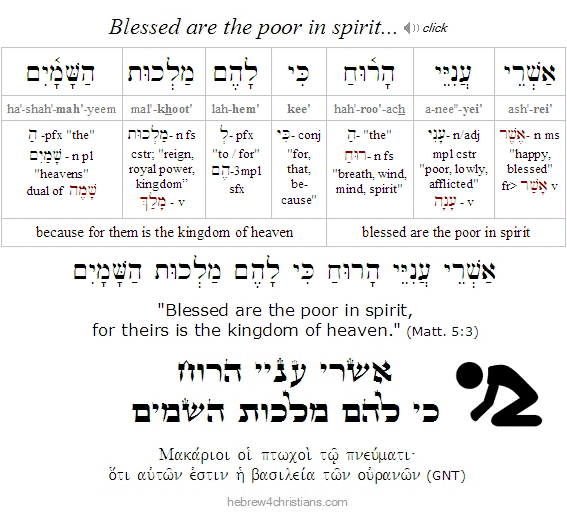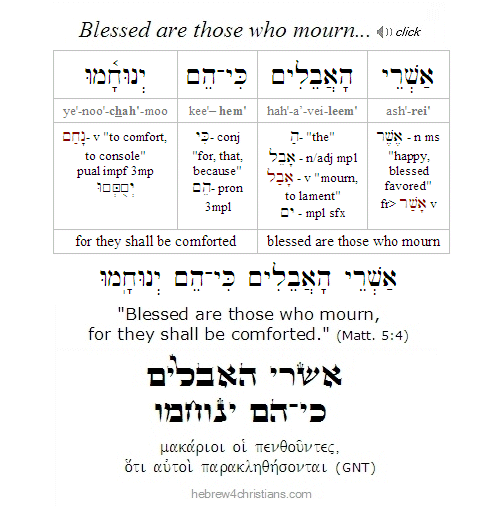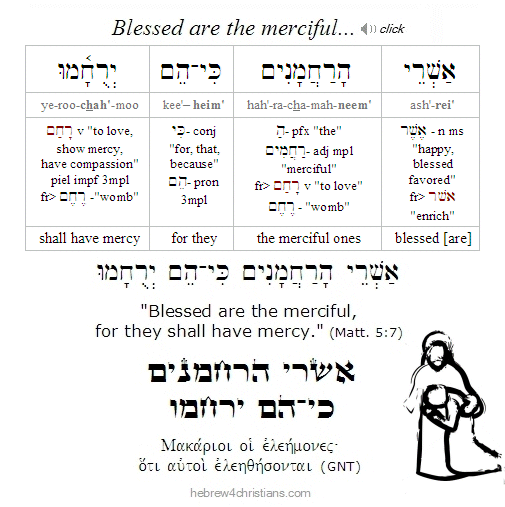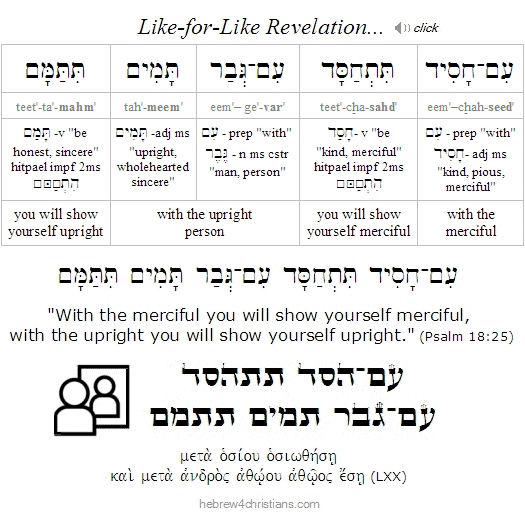|
|
|
|
 |
 |
 |
|
Beatitudes of Jesus
|
|
|
The Blessings of the Kingdom of Heaven....
|
|
|
 |
 |
|
The following is a Hebrew translation of the "Beatitudes" of Yeshua as they appear in the Gospel of Matthew, chapter 5 (i.e., at the beginning of the famous Sermon on the Mount). The Hebrew text comes from Abraham Shmuelof (z"l), and I have read the Hebrew according to his translation from the Greek. I have also included the Greek New Testament text with the Hebrew for reference and provided some additional comments about each verse. It is my prayer that you will find this material helpful. - jjp
|
 |
 |
|
The Beatitudes of Yeshua (Matt. 5:2-12) provide a description of life in the Kingdom of Heaven, since to be in the Kingdom of Heaven means to be comforted, to be accepted, to be satisfied, to be shown mercy, to see God, to be called God's child, and to reign with the Messiah in His glory. Although we tend to think of the Kingdom as something future (and therefore remote), each of these blessings is a present possession for the person of faith (and therefore near). Yeshua was not expressing ethical idealism as much as he was revealing the lifestyle of those who trust in Him.
First it should be mentioned that the initial phrase of each of the Beatitudes does not contain a verb. There is no "are," no "is," no "blessed are..." Instead of reading them as statements, then, (e.g., "blessed are the poor in spirit") they should be read as exclamations: "O the blessedness of the poor in spirit!" This way of reading agrees with the Hebrew use of ashrei (אשׁרי), a particle interjection that means "how happy!" (from the root (אשׁר) that means to walk righteously in joy) that is often used in the Psalms. Each initial phrase therefore does not function as a conditional statement, but rather expresses a present reality: "O the joy of the poor in sprit, of the mourners, of the gentle, of those who sincerely care for what is right, of those who are merciful, of those pure in heart, of those who make peace, of those who are persecuted."
Secondly, some commentators have suggested that the Beatitudes are presented in a progressive order, with each preceding one preparing for what immediately follows. Thus the poor in spirit become mourners over their sinful condition. Humbled, they then deeply care for righteousness and find it in the sacrifice of Yeshua who showed them mercy. As they become merciful, they learn to see beyond appearances to behold inner beauty in everyone. Hatred and strife grieves their hearts, so they become peacemakers. Ultimately, however, their passion makes them misunderstood and mistrusted, and therefore they become subject to persecution....
In general it may be said that the Beatitudes imply the transposition of commonly accepted (i.e., this-worldly) values. What is highly esteemed among the world is of little value to God, and conversely, what is of value to God is often scoffed at by the world... This "transvaluation" of the world's value system is part of the scandal of the gospel message itself (σκανδαλον), as the Apostle Paul later remarked: "For the foolishness of God is wiser than men, and the weakness of God is stronger than men" (1 Cor. 1:25).
Humility is the keynote of the Beatitudes, just as pride is the keynote of fallen human nature. It is utterly incomprehensible for human pride to regard slavery as a status greater than that of power and lordship over others, but this is precisely what Yeshua said: "You know that those who are considered rulers of the Gentiles (goyim) lord it over them, and their great ones exercise authority over them. But it shall not be so among you. But whoever would be great among you must be your servant, and whoever would be first among you must be slave of all. For the Son of Man came not to be served but to serve, and to give his life as a ransom for many" (Mark 10:42-45). There will be many surprises in the world to come, with those considered "first" being regarded as last and those considered "last" regarded as first. The Kingdom of Heaven (מלכות השמים) is a redeemed community of the righteous who practice sacrificial love for the welfare and honor of others. Yeshua (Jesus) is the true King and Source of this Kingdom. And as He will go on to expound in the Sermon on the Mount, the heart of the law is love, and love is the law of the Gospel...
|
|
|
 |
 |
|
The term translated "the poor" (οἱ πτωχοι) is derived from a word that means "to crouch as a helpless beggar." This word provides an image of someone in abject poverty, totally dependent on others for help. The "poor in spirit" (Isa. 61:1) are those who are painfully aware of their exile and need for help from God. When we are emptied of ourselves, we are free from pride and enabled to seek the truth in humility.
|
|
 |
 |
|
Paradoxically we are profoundly enriched by understanding our great inner poverty and our ongoing need for divine intervention... Only when we come to the end of ourselves, when we realize our powerlessness and radical insufficiency, can we come to know Yeshua as moshia (מוֹשִׁיעַ), as our Savior. And this is an ongoing state of dependency: we walk "with a limp" as did Israel. Therefore Paul said, ὅταν γὰρ ἀσθενῶ, τότε δυνατός εἰμι: "for when I am weak, then I am strong." You are made rich indeed when you encounter your spiritual bankruptcy, brokenness, and must entirely depend on God for your daily miracle...
קָרוֹב יְהוָה לְנִשְׁבְּרֵי־לֵב
וְאֶת־דַּכְּאֵי־רוּחַ יוֹשִׁיעַ
ka·rohv · Adonai · le·neesh·be·rei-leiv
ve·et · dak·ei · roo'·ach · yo·shee'·a

"The LORD is near to the broken of heart
and saves the crushed in spirit"
(Psalm 34:18)

Hebrew Study Card
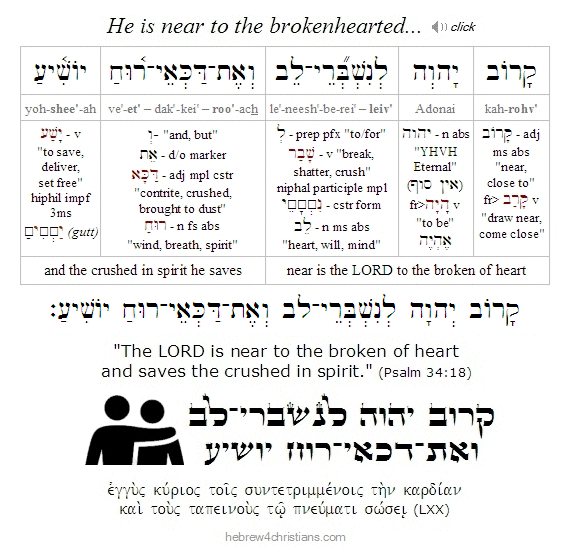 |
Spirituality often enough involves a sense of irremediable brokenness, a feeling that you are not whole, that you are a mess, and that your need for God's healing is constant and relentless... Contrary to the ideals of proud humanism, spirituality is a state of "blessed neediness," of being "poor in spirit," a desperate ache for God's power of healing. Those who humbly cry out to the LORD understand their great need for deliverance, "Woe is me, for I am ruined..." (Isa. 6:5). As Yeshua said, "Everyone who exalts himself will be humbled, but the one who humbles himself will be exalted" (Luke 18:14).
Our Lord Yeshua testified: "The Son of Man came to seek and to save the lost" (Luke 19:10), and therefore He is found in the midst of the leper colonies of the hurting, the forgotten, and the rejected. As the "Man of Sorrows" (i.e., ish makhovot: אִישׁ מַכְאבוֹת) he understands the language of our pain (Isa. 53:3).
The opposite of poverty of spirit is human pride that leads to misery: "O the misery of the proud in spirit, for theirs is the Kingdom of Self." Pride elevates the ego and regards others as a threat to the self's extension and will. Pride is therefore a self-imposed exile, refusing to validate the existence of others and regarding otherness as a menace.
|
 |
 |
|
This is a paradoxical statement, since those who genuinely mourn are anything but happy (i.e., me'ushar or μακαριος). Indeed, according to the world, such a statement seems illogical and perhaps incoherent. The world says, "Enjoy!" but Messiah says, "Grieve!" (Luke 6:21, "Blessed are you that weep now"). But taken in light of that "godly sorrow" that results in teshuvah - repentance - such mourning is indeed a necessary step on the way to eternal happiness (2 Cor. 7:10). This is the sorrow that leads to being "educated for eternity" and invests meaning in suffering that the world lacks. As Socrates once said, "the unexamined life is not worth living" (Apology) but the world system does not examine and therefore grieve over the sinful condition of humanity. Those who are awake, however, realize God grieves in love over a lost world. God will comfort such mourners-- the Greek word means "to call along side" (παρακαλέω) for encouragement and strength.
Mourning is the expression of care, the voice of pain, the sorrow of a broken heart. Those who mourn care deeply; they feel the weight of loss; they grieve over sin. Such sorrow expresses the longing to be released from inner sickness of evil, as Yeshua said: "from within, out of the heart of man, come evil thoughts..." (Mark 7:21). Our own evil desires convict us of the truth... Here there is no place left to hide, no rationalization, no vain hope for self-reformation - just the raw revelation of our fatal condition and the sincere appeal for God's mercy in Yeshua. Mourning over our sins draws us to God, to the Comforter (παράκλητος) who "comes alongside" to bind up the broken heart. The danger remains, however, for those who deny their sin and refuse to mourn, since they are made blind to God's forgiveness and comfort (John 9:41). How shall God be able in heaven to dry up your tears when you have not yet wept?
זאת נֶחָמָתִי בְעָנְיִי
כִּי אִמְרָתְךָ חִיָּתְנִי
zot · ne·cha·ma·tee · ve·ohn·yee'
kee · eem·ra'·te·kha · chee·yaht'·nee

"This is my comfort in my affliction,
that your word gives me life."
(Psalm 119:50)

Hebrew Study Card
 |
One of the great tests of faith is to refuse to succumb to despair in the face of our sins. We must look to the miracle of Yeshua... We must look beyond the realm of appearance, where the "outward man" perishes, to the realm of ultimate healing, where the "inward man" is finally liberated from the ravages of sin and death. This is comfort we have in affliction: God's promise revives our hearts to say, "I know that my Redeemer lives, and at the last he will stand upon the earth" (Job 19:25). Even in the "shadow of the valley of death" (i.e., this moribund and broken world), the LORD is with us and comforts us with His Presence (Psalm 23:4). We are given this great promise: "Just as we have borne the image of the man of dust, we shall also bear the image of the man of heaven" (1 Cor. 15:49).
The opposite of godly sorrow and teshuvah is profane happiness that ultimately leads to misery: "O the misery of those who love this world, for they will receive no consolation in the world to come." Christians are commanded to not love the world or the things in the world because it is passing away along with its profane desires, but whoever does the will of God abides forever (1 John 2:15-17).
|
 |
|
|
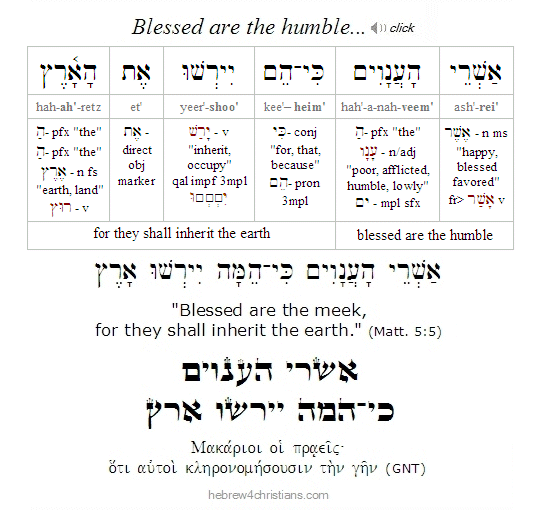 |
 |
 |
|
Yeshua here quotes from Psalm 37:11. The word translated "meek" is πραεις (or πραος), perhaps better rendered as humble or lowly. In the Hebrew text of Psalm 37, the word is anavim (עֲנָוִים), usually translated as "lowly ones" (anavah is the Hebrew word for humility). This word does not suggest weakness, but rather the recognition of one's proper place in the universe before God. It is not self-effacing but rather reality-focused. The meek inherit the earth because they are grounded in the truth of reality...
Those conscious of their inner poverty, who mourn over their sinful condition, and who are afflicted with themselves, can let go of the need to "manage appearances," to be in control, or to seek validation from others, and therefore they are free to surrender their lives to God's care. They "flow" with the Father's will as a "gentle breeze," no longer resisting or striving, but simply trusting in God's care. When they are wronged, they seek neither revenge nor vindication, but only restoration (1 Pet. 2:23). Paradoxically, it takes strength to be genuinely "lowly of heart," but such is found in the Spirit of God (Zech. 4:6). Indeed, the Spirit leads us to our inheritance: "the humble shall inherit the land and delight themselves in great peace" (Psalm 37:11). The fruit of the Spirit is the outgrowth of God's miraculous life with us, and we partake of that life when we live in Yeshua (John 15:1-5; Gal. 5:22-23).
וַעֲנָוִים יִירְשׁוּ־אָרֶץ
וְהִתְעַנְּגוּ עַל־רב שָׁלוֹם
va·a·na·veem · yeer·shoo - a'·retz
ve·heet·a·ne·goo · al - rohv · sha·lom

"But the meek shall inherit the land
and delight themselves in abundant peace."
(Psalm 37:11)

Hebrew Study Card
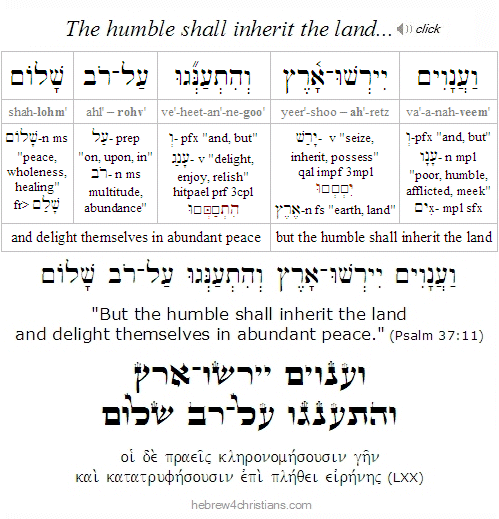
God "opposes the proud but gives grace to the humble." The LORD our God dwells with those "of a contrite and lowly spirit, to revive the spirit of the lowly, and to revive the heart of the contrite" (Isa. 57:15). True greatness is found in outside of the self, beyond the instincts of the carnal ego. Those who seek to exalt themselves and to "gain the world" do not understand that the very reason for their life is to be sacrificed for the sake of love. Obeying God's call to love is not a burden, but rather sets the heart free. As Yeshua said, "Come to me, all who labor and are heavy laden, and I will give you rest. Take my yoke upon you, and learn from me, for I am gentle and lowly in heart, and you will find rest for your souls. For my yoke is easy, and my burden is light" (Matt. 11:28-30).
Humility suggests the acceptance of the principle gam zu l'tovah - "this too is for the best" indicating faith that God will work all things for good to those who trust in Him (Rom. 8:28). The meek person realizes that the only person he can control, and should control, is himself... As Socrates once said, "No evil can come to a righteous man."
The opposite of the "meekness" is self-assertiveness, manipulation, deception, and violent aggressiveness. "O the misery of those demand their "rights" in this world, for they will receive no inheritance in the world to come."
|
 |
|
|
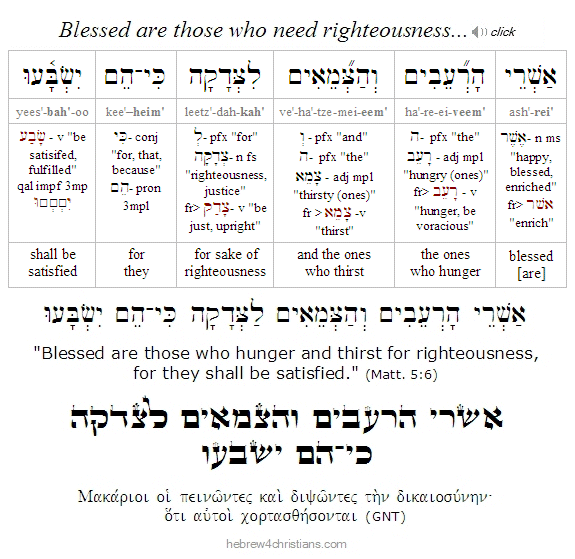 |
 |
 |
|
The word translated "hunger" (πειναω) is related to the word for the poor person who toils in order to fight off starvation. It is a word that depicts a deep craving or longing. The word translated "thirst" (διψαω) is an even stronger word that suggests a painful need for water to stay alive. Some commentators have said that Yeshua was being especially gracious in these words, taking the sincere intention of the heart for the deed. Who among us can claim true righteousness in deed and in truth? But those who hunger and thirst for righteousness - both personal and for the world at large - will ultimately find their satisfaction. Moreover, righteousness here most likely refers to an imputed, divinely given righteousness, gained by grace through faith in Yeshua Himself. Hungering and thirsting for this righteousness therefore means relying upon God alone to meet our need.
"As the deer pants for the water brooks, so pants my soul for You, O God. My soul thirsts for God, for the living God. When shall I come and appear before God?" (Psalm 42:1-2). Yeshua is the satisfaction and fulfillment of our spiritual needs. He is the Bread of Life; the One who imparts Living Waters. In olam haba (the world to come), it is written: "They shall neither hunger anymore nor thirst anymore; ... for the Lamb who is in the midst of the throne will shepherd them and lead them to living fountains of waters" (Rev. 7:16-17).
Many people hunger for spiritual experiences, for material "blessings," or for signs of the miraculous, while others seek knowledge and wisdom, but it is the righteousness of God that alone truly satisfies the heart (Matt. 6:33). This righteousness is not achieved by means of performing religious rituals or by doing good deeds, but instead "comes to life" within the heart by trusting in Yeshua, the righteousness of God (צִדְקַת אֱלהִים). He is the vine and we are branches, and as we draw life from him, his life flows within us to bear deeds of righteousness to the praise and glory of God (John 15:1-5; 1 John 3:7). But note that while we can't attain righteousness by means of virtuous deeds, the cost for attaining such is confession of the truth of our condition: brokenness and mourning of heart (Matt. 5:3-4). Those who profoundly hunger for deliverance from their moral bankruptcy and grieving of heart will be satisfied, but only those who do so. God will indeed wipe away our tears, but the tears must be shed...
The Torah of Yeshua is heeded by the "impoverished of spirit" who know they must "find God or die." It is first a word spoken to the shattered of heart and crushed of spirit. Those who empty themselves before God will find their own desire fulfilled, for God will satisfy them with inner peace and joy. This is the righteousness of God that is known by yielding to His love secured in Messiah. The "fruit of the Spirit" is then expressed in the heart through acts of gratitude and mercy, that is, "faith working through love" (Gal. 5:6). Teshuvah is always a response to God's compassion, as it says, "we love him because he first loved us" (1 John 4:19). Paradoxically, we never find ultimate satisfaction in finite things, but only by seeking the Eternal One, and by means of seeking the infinite we find the delight to seek further still: "Come further up, come further in!" It is great blessedness to be desperate for God, to long for him more and more; to keep asking, seeking, knocking (Matt. 7:7). When we seek first the kingdom of God and his righteousness as our supreme need, God will satisfy us by drawing us into an ever-deepening desire for him.
כִּי־הִשְׂבִּיעַ נֶפֶשׁ שׁקֵקָה
וְנֶפֶשׁ רְעֵבָה מִלֵּא־טוֹב
kee · hees·bee'·a · ne'·fesh · sho·kei·kah
ve·ne'·fesh · re·e·vah · mee·lei-tohv

"For he satisfies the thirsting soul,
and the hungry soul he fills with good things."
(Psalm 107:9)

The LORD alone can satisfy the eternal yearning of our spiritual nature. As Augustine said, "You have made us for yourself, O Lord, and our hearts are restless until they rest in you."
"Blessed are those who hunger and thirst for righteousness, for they shall be filled" (Matt. 5:6). This beatitude again follows logically from the previous ones; it is a statement to which all the others lead. It is the logical conclusion to which they come, and it is something for which we should all be profoundly thankful and grateful to God. I do not know of a better test that anyone can apply to himself or herself in this whole matter of the Christian profession than a verse like this. If this verse is to you one of the most blessed statements of the whole of Scripture, you can be quite certain you are a Christian. If it is not, then you had better examine the foundations again." - D. Martin Lloyd Jones: Studies in the Sermon on the Mount
This great blessedness is found only by those who seek God be'khol levavkha, with all their heart, as it is written: "Seek me and live" (Amos 5:4). But we must be vigilant, since a common tactic of the enemy of our souls is to induce us to forget our desperate need, seducing us to think we have already "arrived" or that we "know" all the answers. This is a grave danger. Those who regard themselves as rightly related to God are often deluded regarding their spiritual status (Luke 18:9-14; Rev. 3:15-20). The seeking heart is humble and knows that it has not yet attained to righteousness (Phil. 3:12-14).
|
 |
 |
|
The pagan Roman world despised pity (as did Nietzsche), whereas the Pharisees related suffering to sin (see Matt. 23:23). Indeed the idea of "karma" -- the idea that suffering is a necessary evil, an immutable consequence for sin (either in this life or a previous one) is an age-old belief. In contrast to these widespread ideas of the day, Yeshua instructs that we should show sympathy and lovingkindness to those who are afflicted.
"Whoever shuts his ears to the cry of the poor will also cry himself and not be heard" (Prov. 21:13). The merciful show rachamim, a word that comes from the word "rechem," the Hebrew word for "womb." To have compassion then means to express pity as we have for the love of an unborn child. The quality of compassion is called rachamanut. Beyond this, mercy involves empathy and love expressed for the miserable. "The righteous shows mercy and gives" (Psalm 37:21). Sacrificial love is the practice of mercy.
|
 |
|
|
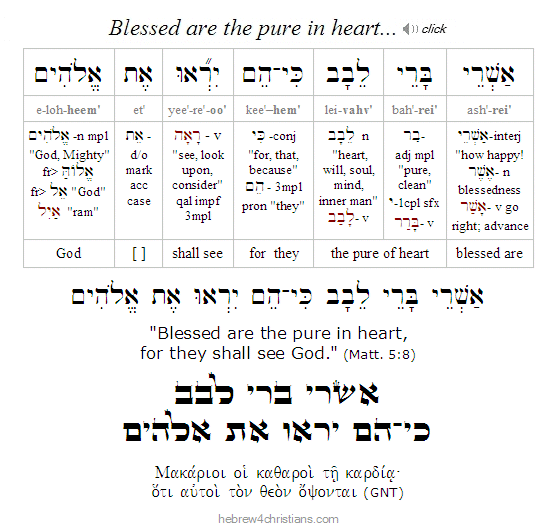 |
 |
 |
|
In Hebraic thinking, the heart (לֵב) includes the mind, emotions, will, and inner life of the self. The heart is the whole person... The pure hearted person has no desire for falsehood (Psalm 24:4) and expresses "singleness of heart" (ἐν ἁπλότητι καρδίας) in their devotion to God (Col. 3:22). King David furthermore wrote, "the commandments of the LORD are pure, enlightening the eyes" (מִצְוַת יהוה בָּרָה מְאִירַת עֵינָיִם). Yeshua told us that submitting ourselves to God yields inward purity that will result in a face-to-face (פָּנִים אֶל־פָּנִים) experience of God Himself (1 Cor. 13:12, Rev. 22:4): "and they will see His face" - καὶ ὄψονται τὸ πρόσωπον αὐτοῦ.
Inner purity -- "purity of the heart" -- is of great value, since it implies, as Kierkegaard noted, "to will one thing." We simply cannot see God if we are duplicitous or wavering in our passion for His Presence and truth. The pure in heart see God around them, even if others are blind. Every lilly of the valley is arrayed in God's glory; every bush is aflame with His Presence... For those whose greatest desire is to see God, Yeshua promises fulfillment.
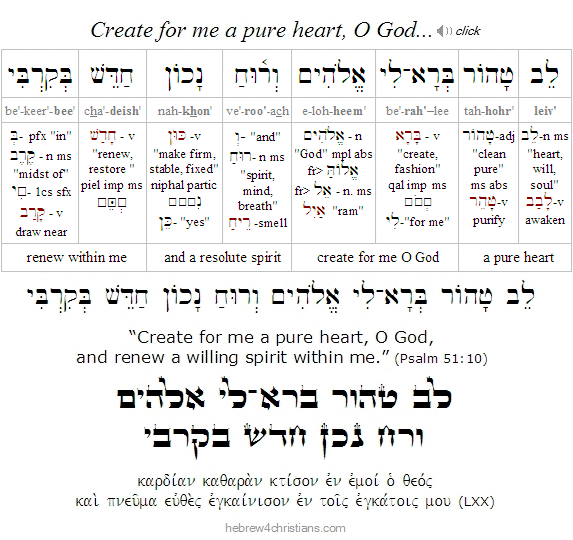 |
|
 |
|
|
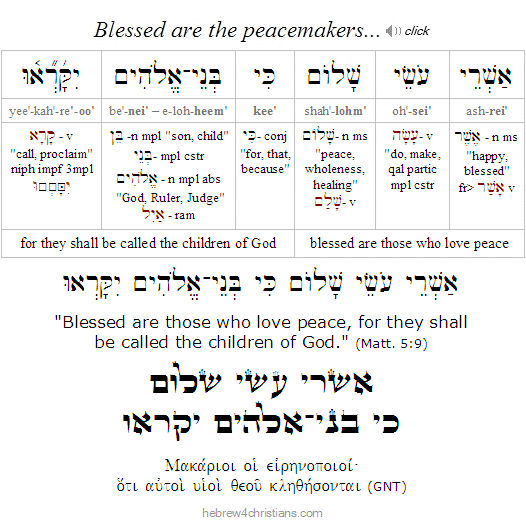 |
 |
 |
|
The Hebrew word shalom means "wholeness," "completeness," "healing" -- not merely the absence of strife. Shalom implies the positive enjoyment of God and "pleasures forevermore." In Jewish ethical teaching, redifat shalom (רְדִיפַת שָׁלוֹם), "seeking peace," is considered a primary heart quality. Rabbi Hillel is attributed as saying, "Be of the disciples of Aaron, loving peace and pursuing peace" (Pirke Avot 1:2).
The entire life of Yeshua is marked by peace. He is called Sar Shalom, the Prince of Peace (Isa. 9:6). God is called El Shalom, the God of Peace (Rom. 15:33, Heb. 13:20, etc.), and salvation itself brings reconciliation (peace) between God and man (Rom. 5:1).
So important is this idea of reconciliation, that Yeshua states that those who "make peace" will be called the sons of God. Peacemakers are one with the Father. The world bestows its honors upon those who are war-makers and who routinely exercise self-aggrandizing "will to power." But "the fruit of righteousness is sown in peace by those who make peace" (James 3:18). Yeshua promised that those who regularly practice/make shalom will be called "children of the living God" - bnei el chai (בְּנֵי אֵל־חָי). Those who seek peace by loving their enemies are doing as the Father does, and therefore they are demonstrating that they are His children (Matt. 5:44-45).
|
 |
|
|
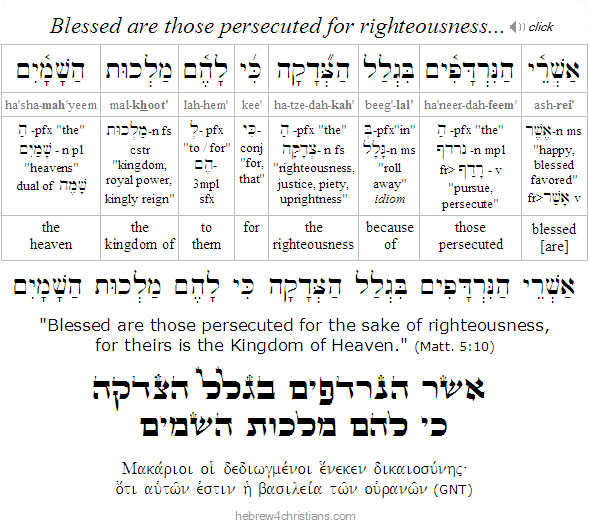 |
 |
 |
 |
 |
|
 |
 |
 |
|
Note that many Christian commentators add the following verses to complete the eighth beatitude: "Blessed are you when others revile you and persecute you and utter all kinds of evil against you falsely on my account. Rejoice and be glad, for your reward is great in heaven, for so they persecuted the prophets who were before you" (Matt. 5:11-12).
It is a frightening thought to consider that our faith is so tepid that the wicked do not persecute but simply ignore us. If we are not experiencing some kind of opposition and persecution, it might be a symptom that our faith is weak...
Yaakov Damkani, an Israeli believer who evangelizes in Israel, once said that he cannot understand why some Christians sympathize over the abuse he suffers as he shares the gospel (Yaakov has been spit upon, verbally abused, and even assaulted for sharing his faith). Yaakov asks why such well-meaning people are not rather envious, especially in light of the words of Yeshua. The prophets of God were not a glum bunch who were nursing their wounds, but rather a joyous company, and Yeshua tells us that if we experience opposition and persecution, we are in good company! Persecution for the sake of Yeshua and righteousness is cause for celebration, simcha!
Are there rewards in heaven? Yeshua says there are. Those who suffer persecution for His sake are promised "great reward." Does this contradict the idea that we are all saved by grace through faith -- and not by "works of righteousness which we have done" (Eph. 2:8; Titus 3:5-6)? No, because the reward, as well the faith, is ultimately the free gift of God. Our motivation for reward should be simply to love and please the Lord Yeshua, not for crass notions of selfish enjoyment of pleasures (e.g., 70 virgins in heaven or the ability to eat and drink ourselves silly, etc.).
The Jewish sages taught that to do a good deed (mitzvah) leshem shamayim - for the sake of heaven - is better than doing it for the sake of reward, but they nonetheless wrote about reward in olam haba, the world to come. Righteous deeds are required of all Jews: "If you have done much in Torah do not claim merit for yourself, because for this purpose you were created" (Pirke Avot 2:8), yet, "the reward is in proportion to the toil" (Pirke Avot 5:23). "Be not like servants who serve the master on condition that they receive a reward. Rather be like servants who serve the master irrespective of any reward. And let the fear of heaven be upon you" (Avot 1:3).
These thoughts are not unlike those of Yeshua, though of course Yeshua repeatedly warned against false shows of righteousness and religious externalism. Moreover, Yeshua took issue with the idea that salvation - the ultimate reward, after all - can be earned, since: 1) the reward is immeasurably great (Matt. 20:1-16; 25:21-23); 2) it is disproportionate to any service possibly rendered to God (Matt. 19:29, 25:21-23), and 3) is entirely a free gift (John 4:10, Rom. 6:23, Eph. 2:8). Indeed salvation is the blessing of being in a state of righteousnes that comes from trusting in the sacrificial death, burial, and resurrection of the Messiah (1 Cor. 15:3-5). L'Adonai ha-yeshuah (לַיהוָה הַיְשׁוּעָה), "salvation is from the LORD," and is therefore exclusively a divine prerogative.
<< Return
|
|
|
Hebrew for Christians
Copyright © John J. Parsons
All rights reserved.
|
|
|
|
 |
|
|
|
|
|
|


